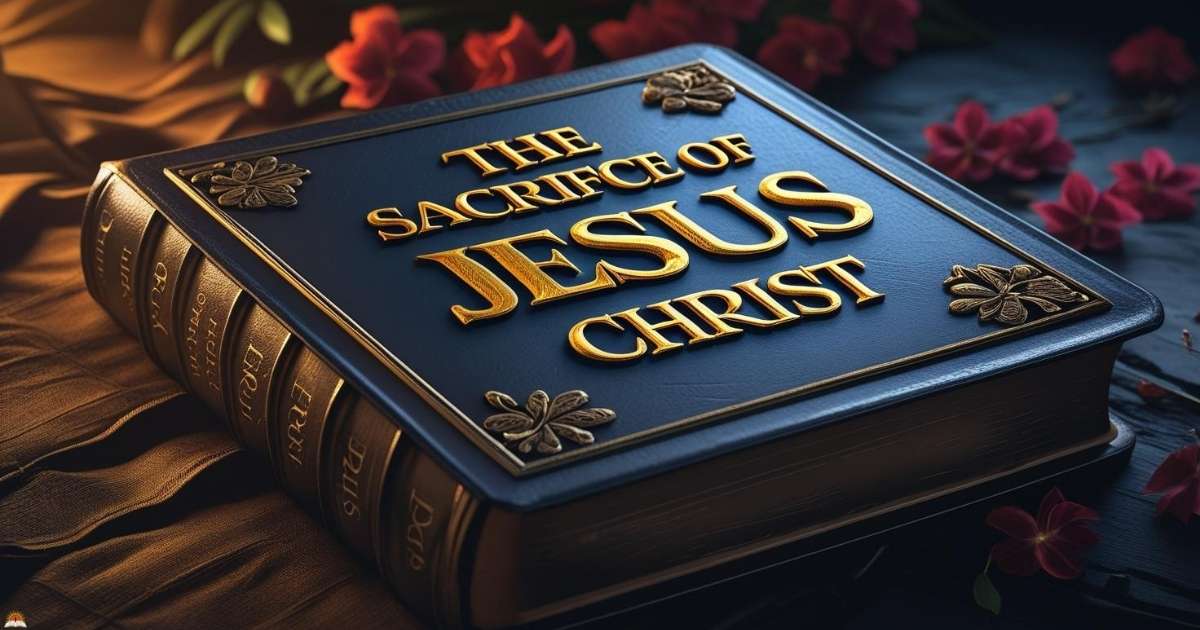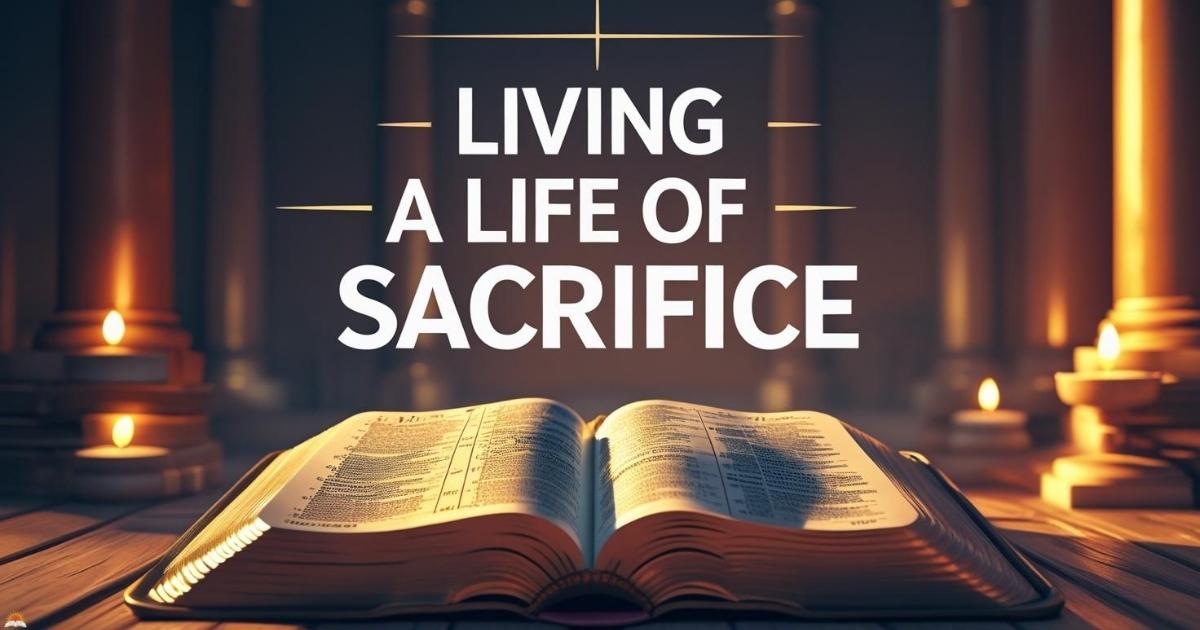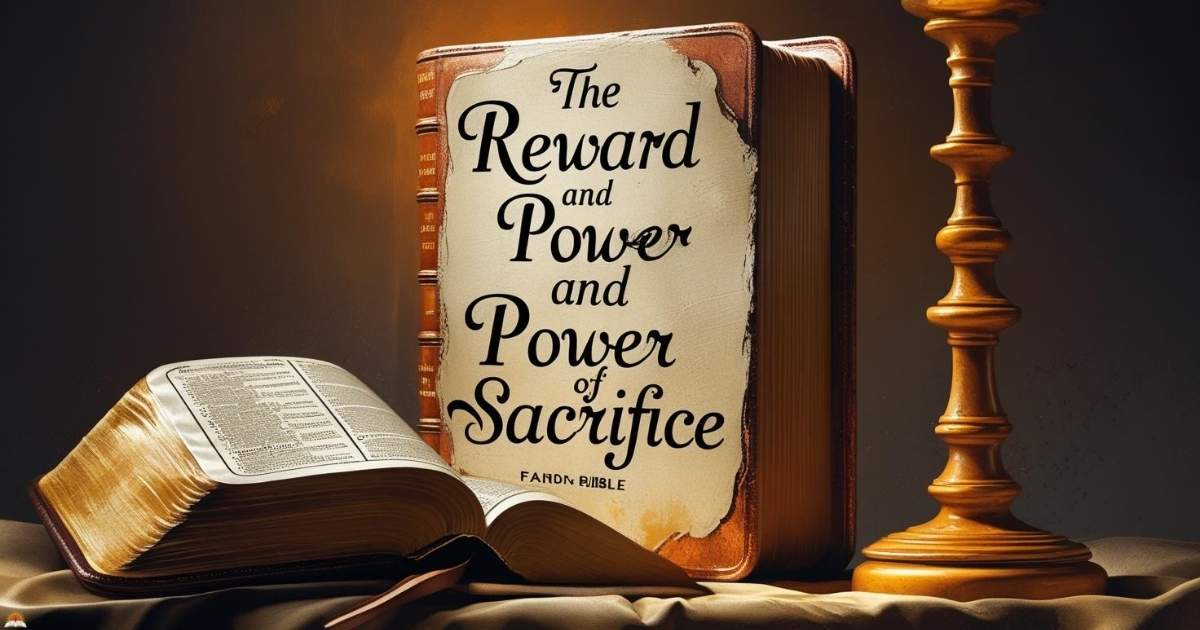Sacrifice is the act of giving up something valuable for the sake of something greater. In spiritual terms, it often means surrendering comfort, desires, or personal gain to honor God, help others, or stay true to what is right. It can be physical, emotional, or even unseen—like giving time, forgiving someone, or choosing humility over pride.
In the Bible, sacrifice is both an offering and a heart posture. It shows deep love, trust, and obedience. Whether it is Abraham placing Isaac on the altar or Jesus giving His life, every true sacrifice points to a bigger purpose beyond self.
This article brings together meaningful verses that show the purpose, strength, and spiritual reward behind giving up something for a greater good. Each verse is shared with clear insight to help you reflect, grow, and walk in faith with confidence.
Old Testament Examples of Sacrifice
Genesis 22:2
“Take your son, your only son Isaac, whom you love, and go to the land of Moriah, and offer him there as a burnt offering on one of the mountains of which I shall tell you.”
Description: God commands Abraham to offer his beloved son Isaac as a sacrifice.
Explanation: This verse reveals one of the most powerful tests of faith in the Old Testament. Abraham’s willingness to sacrifice Isaac shows complete trust in God. Although God stops him, the moment highlights how deep and personal true sacrifice can be. It foreshadows God’s own sacrifice of His Son.
Exodus 29:18
“Then burn the entire ram on the altar. It is a burnt offering to the Lord, a pleasing aroma, a food offering presented to the Lord.”
Description: Instructions for offering a burnt sacrifice to God as part of priestly consecration.
Explanation: In this sacrificial act, the whole ram is offered, symbolizing full surrender and devotion. It reflects how offerings were meant to honor God completely. The phrase “pleasing aroma” shows that God values wholehearted giving.
Leviticus 1:4
“He shall lay his hand on the head of the burnt offering, and it shall be accepted for him to make atonement for him.”
Description: This verse explains the ritual of laying hands on the animal before sacrifice.
Explanation: By placing a hand on the animal, the person symbolically transfers their guilt. The sacrifice becomes a substitute. It shows how sacrifice was used for atonement and points forward to Jesus as the ultimate substitutionary sacrifice.
Leviticus 17:11
“For the life of the flesh is in the blood, and I have given it for you on the altar to make atonement for your souls, for it is the blood that makes atonement by the life.”
Description: God explains the purpose and power of blood in sacrifice.
Explanation: This verse highlights that life is sacred and blood represents life itself. Sacrifice is not just a ritual—it involves the cost of life. It sets the foundation for understanding why Jesus’ blood was necessary for redemption.
Numbers 6:14
“And he shall bring his gift to the Lord, one male lamb a year old without blemish for a burnt offering, and one ewe lamb a year old without blemish as a sin offering, and one ram without blemish as a peace offering.”
Description: Sacrificial offerings required from someone completing a Nazirite vow.
Explanation: Each animal has a different purpose—burnt, sin, and peace offerings. This variety shows how deeply embedded sacrifice was in worship and personal commitment. The requirement of “without blemish” represents purity and respect toward God.
1 Samuel 15:22
“But Samuel replied: ‘Does the Lord delight in burnt offerings and sacrifices as much as in obeying the Lord? To obey is better than sacrifice, and to heed is better than the fat of rams.’”
Description: Samuel rebukes Saul for valuing ritual over obedience.
Explanation: This verse teaches that sacrifice means nothing without a heart that follows God. Obedience is the deeper sacrifice. It challenges shallow religious acts and reminds us that God looks at the heart, not just the offering.
2 Chronicles 7:1
“As soon as Solomon finished his prayer, fire came down from heaven and consumed the burnt offering and the sacrifices, and the glory of the Lord filled the temple.”
Description: God visibly accepts Solomon’s sacrifice during the dedication of the temple.
Explanation: This supernatural moment shows that when sacrifice is genuine, God responds in power. It affirms that sacrifice was not only symbolic but also deeply relational—God’s glory fills the space where true offerings are made.
Psalm 4:5
“Offer the sacrifices of the righteous and trust in the Lord.”
Description: A short call to righteous sacrifice and trust.
Explanation: Sacrifice is not just about giving things up—it is about doing what is right. This verse links sacrifice with personal integrity and faith. Righteousness and trust are the inner fuel of meaningful sacrifice.
Psalm 51:17
“The sacrifices of God are a broken spirit; a broken and contrite heart, O God, you will not despise.”
Description: David reflects on true sacrifice after his sin.
Explanation: This verse cuts to the core of what God truly wants—not animals, but humility. A broken heart is more powerful than ritual. Real sacrifice begins with inner repentance and honest surrender.
Proverbs 21:3
“To do righteousness and justice is more acceptable to the Lord than sacrifice.”
Description: Doing what is right is more pleasing to God than ritual offerings.
Explanation: Like Samuel’s rebuke to Saul, this verse reminds us that external acts cannot replace a life lived rightly. God values justice, honesty, and moral integrity far more than symbolic sacrifices.
Read Also >>> 35 Bible Verses About Redemption
The Sacrifice of Jesus Christ

Isaiah 53:5
“But he was pierced for our transgressions; he was crushed for our iniquities; upon him was the chastisement that brought us peace, and with his wounds we are healed.”
Description: A prophecy about the suffering servant who would be sacrificed for others.
Explanation: This verse is often seen as a direct foreshadowing of Jesus. It shows the depth of His sacrifice—suffering not for His own sin, but for ours. True peace and healing come at the cost of His wounds.
John 1:29
“The next day John saw Jesus coming toward him and said, ‘Look, the Lamb of God, who takes away the sin of the world!’”
Description: John the Baptist identifies Jesus as the sacrificial Lamb.
Explanation: Calling Jesus the “Lamb of God” connects Him to Old Testament sacrifices. Lambs were offered for sin, and Jesus fulfills that role perfectly. His entire mission is centered on the ultimate act of sacrifice.
John 10:11
“I am the good shepherd. The good shepherd lays down his life for the sheep.”
Description: Jesus describes Himself as a shepherd willing to die for His flock.
Explanation: This is personal and intentional. Jesus does not just allow Himself to be taken—He chooses to lay down His life. True sacrifice always involves willing love, not forced duty.
Romans 5:8
“But God demonstrates his own love for us in this: While we were still sinners, Christ died for us.”
Description: Paul explains how Christ’s sacrifice reveals God’s deep love.
Explanation: Jesus did not wait for us to be clean or worthy. His sacrifice was made while we were still broken. That is the kind of love that does not expect perfection—it gives everything anyway.
Ephesians 5:2
“And walk in love, as Christ loved us and gave himself up for us, a fragrant offering and sacrifice to God.”
Description: Paul calls believers to love like Jesus, who sacrificed Himself.
Explanation: This verse links love directly to sacrifice. It describes Jesus’ death as a “fragrant offering,” showing that true sacrifice is pleasing to God when rooted in love.
Hebrews 9:12
“He did not enter by means of the blood of goats and calves; but he entered the Most Holy Place once for all by his own blood, thus obtaining eternal redemption.”
Description: Jesus’ sacrifice replaces the old sacrificial system.
Explanation: The old system required animal blood repeatedly. Jesus changed everything. His blood was enough once for all. That is the power of His perfect and eternal sacrifice.
Hebrews 9:26
“But as it is, he has appeared once for all at the end of the ages to put away sin by the sacrifice of himself.”
Description: Jesus’ one-time sacrifice ended the need for continual offerings.
Explanation: He did not just cover sin—He removed it. This verse shows that Jesus’ sacrifice was not temporary. It was final, complete, and forever effective.
Hebrews 10:10
“And by that will, we have been made holy through the sacrifice of the body of Jesus Christ once for all.”
Description: Christ’s physical body became the final offering for human holiness.
Explanation: We are not made holy by trying harder or doing more religious acts. Holiness comes through His body sacrificed for us. That is the central truth of Christian faith.
1 Peter 1:18–19
“You were ransomed from the futile ways inherited from your forefathers, not with perishable things such as silver or gold, but with the precious blood of Christ, like that of a lamb without blemish or spot.”
Description: Peter reminds believers of the price of their redemption.
Explanation: Money could never buy salvation. Only the spotless blood of Jesus—pure, perfect, and freely given—could ransom us from sin. Sacrifice means value, and we were bought at the highest cost.
1 John 4:10
“This is love: not that we loved God, but that he loved us and sent his Son as an atoning sacrifice for our sins.”
Description: God initiated love by offering His Son as a sacrifice.
Explanation: This verse redefines love. It is not something we start. It starts with God. Jesus’ sacrifice proves that love means giving the most precious gift—at the greatest cost—for someone else’s good.
Living a Life of Sacrifice

Romans 12:1
“I appeal to you therefore, brothers, by the mercies of God, to present your bodies as a living sacrifice, holy and acceptable to God, which is your spiritual worship.”
Description: Believers are urged to offer themselves as living sacrifices.
Explanation: This verse shifts the idea of sacrifice from altars to daily life. True worship is not limited to rituals—it is how you live. Every act of obedience, discipline, and love becomes a personal offering to God.
Philippians 2:17
“But even if I am being poured out like a drink offering on the sacrifice and service coming from your faith, I am glad and rejoice with all of you.”
Description: Paul describes his ministry as a sacrifice for others.
Explanation: Paul sees his suffering not as loss, but as a joyful offering. Sacrifice often means pouring yourself out to strengthen someone else’s faith. It costs something—but it multiplies joy.
Philippians 4:18
“I have received full payment, and more. I am well supplied, having received from Epaphroditus the gifts you sent, a fragrant offering, a sacrifice acceptable and pleasing to God.”
Description: Paul thanks the Philippians for their generous support.
Explanation: Their financial gift is seen as more than help—it is an act of worship. Sacrifice is not just about spiritual acts. Giving, generosity, and support are all ways of offering something sacred to God.
Matthew 16:24
“Then Jesus said to his disciples, ‘Whoever wants to be my disciple must deny themselves and take up their cross and follow me.’”
Description: Jesus calls His followers to a life of daily sacrifice.
Explanation: Following Christ is not about comfort. It means self-denial, surrender, and obedience. The cross is not a decoration—it is a symbol of dying to self. Sacrifice is the foundation of real discipleship.
Luke 14:27
“Whoever does not bear his own cross and come after me cannot be my disciple.”
Description: Jesus emphasizes the cost of following Him.
Explanation: This verse challenges shallow faith. You cannot follow Christ halfway. Sacrifice is not optional—it is proof of genuine commitment. Carrying your cross means choosing Jesus over everything else.
Luke 21:3–4
“Truly I tell you,” he said, “this poor widow has put in more than all the others. All these people gave their gifts out of their wealth, but she out of her poverty put in all she had to live on.”
Description: Jesus praises a widow’s sacrificial giving.
Explanation: Sacrifice is measured by the heart, not the amount. This woman gave everything. That kind of giving moves God deeply. Her story reminds us that the greatest offerings often come from places of lack.
1 Corinthians 10:24
“Let no one seek his own good, but the good of his neighbor.”
Description: Paul encourages believers to live for others, not themselves.
Explanation: A sacrificial life means laying down selfish interests. Every choice should consider how it affects others. This mindset builds a life of purpose, compassion, and spiritual maturity.
2 Corinthians 5:15
“And he died for all, that those who live should no longer live for themselves but for him who died for them and was raised again.”
Description: Christ’s sacrifice calls us to live for Him, not ourselves.
Explanation: Jesus did not give His life so we could stay the same. We are called to live differently—surrendered, focused, and selfless. Living for Christ is the ultimate response to His sacrifice.
Galatians 2:20
“I have been crucified with Christ. It is no longer I who live, but Christ who lives in me.”
Description: Paul describes his personal surrender to Christ.
Explanation: This is a picture of spiritual sacrifice. When you give your life to Christ, your old self dies. His Spirit lives through you. That is the deepest form of sacrifice—giving up control and letting God lead.
Colossians 3:17
“And whatever you do, whether in word or deed, do it all in the name of the Lord Jesus, giving thanks to God the Father through him.”
Description: Every action should be an offering to God.
Explanation: This verse transforms everyday life into sacred ground. Whether it is your work, speech, or attitude—doing it all for Christ turns ordinary moments into spiritual sacrifice. Gratitude fuels that kind of life.
Also Read More >>> 35 Bible Verses About Procrastination
The Reward and Power of Sacrifice

Matthew 19:29
“And everyone who has left houses or brothers or sisters or father or mother or children or lands, for my name’s sake, will receive a hundredfold and will inherit eternal life.”
Description: Jesus promises eternal reward for those who sacrifice for Him.
Explanation: Letting go of what you love for the sake of Christ is never in vain. He does not ignore the cost. Sacrifice for His name brings multiplied blessing, both in this life and the life to come.
Mark 10:45
“For even the Son of Man did not come to be served, but to serve, and to give his life as a ransom for many.”
Description: Jesus describes His purpose as one of service and sacrifice.
Explanation: He gave everything, not to receive glory, but to rescue others. His life was poured out like a payment. This verse reveals the heart of God: real power comes through humility and sacrifice.
Luke 6:38
“Give, and it will be given to you. Good measure, pressed down, shaken together, running over, will be put into your lap.”
Description: Jesus explains the overflowing return of generosity.
Explanation: Sacrifice often feels like loss, but in God’s economy, it multiplies. Giving from the heart opens the door to abundance—not always material, but spiritual and relational overflow that cannot be measured.
2 Samuel 24:24
“But the king replied to Araunah, ‘No, I insist on paying you for it. I will not sacrifice to the Lord my God burnt offerings that cost me nothing.’”
Description: King David refuses to offer a cheap or easy sacrifice.
Explanation: Real sacrifice involves real cost. David understood that worship without cost is empty. This verse reminds us that meaningful sacrifice always requires something valuable—and God honors that.
Hebrews 13:16
“Do not neglect to do good and to share what you have, for such sacrifices are pleasing to God.”
Description: Daily acts of kindness and generosity are seen as sacrifices.
Explanation: Sacrifice is not always dramatic. Simple goodness—serving, giving, sharing—is sacred. God sees every act done in love and counts it as a true offering.
Revelation 5:9
“And they sang a new song, saying: ‘You are worthy to take the scroll and to open its seals, because you were slain, and with your blood you purchased for God persons from every tribe and language and people and nation.’”
Description: Heaven praises Jesus for His sacrificial death.
Explanation: This verse reveals the eternal impact of sacrifice. Jesus’ blood bought redemption for all people. Sacrifice breaks barriers, restores relationships, and brings global healing. It echoes forever in heaven.
Malachi 1:11
“For from the rising of the sun to its setting, my name will be great among the nations, and in every place incense will be offered to my name, and a pure offering.”
Description: God declares that pure worship will rise from every nation.
Explanation: Sacrifice is not confined to one place or people. True offerings come from hearts everywhere. This verse shows that God values global, pure, sincere devotion more than hollow ritual.
Psalm 50:14
“Sacrifice thank offerings to God, fulfill your vows to the Most High.”
Description: Worship through thanksgiving and faithfulness is a form of sacrifice.
Explanation: Gratitude is not just a feeling—it is something to offer. This verse encourages us to respond to God’s goodness with thankful hearts and loyal actions. That is the kind of sacrifice God desires.
Hosea 6:6
“For I desire steadfast love and not sacrifice, the knowledge of God rather than burnt offerings.”
Description: God speaks through Hosea to correct hollow religious practice.
Explanation: This verse shifts the focus from outward sacrifice to inner devotion. God does not want empty rituals. He wants love, loyalty, and relationship. Sacrifice without heart means nothing.
Matthew 9:13
“But go and learn what this means: ‘I desire mercy, not sacrifice.’ For I have not come to call the righteous, but sinners.”
Description: Jesus confronts those who misunderstand the heart of God.
Explanation: Jesus echoes the message from Hosea, reminding us that mercy matters more than ritual. True sacrifice includes compassion and grace. This verse teaches that love for others is often the greatest offering.
The power of sacrifice Bible verse
The power of sacrifice in the Bible verse highlights how giving up something meaningful can lead to lasting spiritual growth and strength. You will find powerful verses with real-life insight to help you walk in deeper purpose and faith.
Romans 12:1
“Therefore, I urge you, brothers and sisters, in view of God’s mercy, to offer your bodies as a living sacrifice, holy and pleasing to God—this is your true and proper worship.”
Description: Paul challenges believers to offer their entire lives as living sacrifices to God.
Explanation: This verse flips the idea of sacrifice. It’s not just about giving up things—it’s about giving your whole self. Not one moment or one offering, but a lifestyle. When you surrender your body, choices, time, and energy to God, that becomes powerful worship. Sacrifice here isn’t about pain. It’s about purpose. Your life, fully yielded, becomes a platform for God’s glory. That’s where true power begins.
You May Also Like:
35 Bible Verses About Rejoicing
50 Bible Verses About Harvest
Conclusion
Sacrifice is not just about loss. It is about love, obedience, and choosing what truly matters. These verses have shown how giving up something can lead to deeper faith, stronger character, and a life that honors God. Whether in quiet moments or life-changing decisions, sacrifice holds real spiritual power. May these words guide your heart, strengthen your walk, and remind you that every step given in faith is never wasted.
For more heartfelt wishes, powerful prayers, and uplifting Bible verses, visit HolyBiblePraise.com — your peaceful corner of faith and prayer!

I’m Talal Mudassar, the founder of HolyBiblePraise.com, with over three years of experience in blogging about the Bible, faith, and Christian teachings. My passion is to create insightful, biblically accurate, and inspiring content that helps believers grow spiritually. Through HolyBiblePraise, I aim to make God’s Word more accessible and meaningful for everyone. Let’s grow in faith together!

